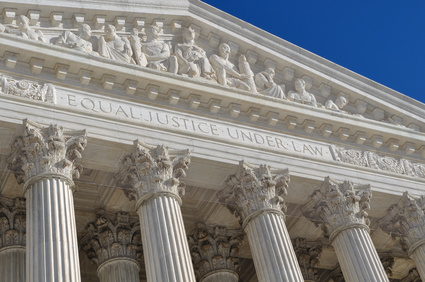The U.S. District Court for the Eastern District of Pennsylvania on Feb. 7 handed down a decision finding that the mere use of a letter vendor is sufficient to allege a violation of 15 U.S.C. § 1692c(b) of the Fair Debt Collection Practices Act by transmitting information to the letter vendor.
Posts published by “Brent Yarborough”
Brent Yarborough practices in Maurice Wutscher's Birmingham office in its Appellate, Commercial Litigation, Consumer Credit Litigation and Regulatory Compliance groups. He has substantial experience representing financial institutions, debt buyers and law firms. He has defended cases involving the Fair Debt Collection Practices Act, the Fair Credit Reporting Act, the Truth In Lending Act, and various state law claims asserted against lenders and their assignees. He has also provided compliance advice on matters related to the FDCPA, UDAAP, and state debt collection and privacy laws. He is a frequent speaker to national audiences and publishes on topics related to consumer financial services regulation and litigation. For many years Brent served on the Executive Board of the Birmingham Bar Association’s Bankruptcy and Commercial Law Section. He also served on the Legislative Task Force of the Creditor Attorney Association of Alabama and is a past president of the Birmingham-Southern College National Alumni Association. He formerly served as Secretary of NARCA – The National Creditors Bar Association, after serving on its Board of Directors for eight years. In addition, he chaired NARCA’s Government and Regulatory Affairs Committee. Yarborough earned his B.A., cum laude, from Birmingham-Southern College and his J.D. from Cornell University, where he was Secretary/Treasurer of the Cornell Law School Moot Court Board. For more information, see https://mauricewutscher.com/attorneys/brent-yarborough/
Costumes, candy, and frightening movie sequels often mark the end of October. Just in time for Halloween, the U.S. Court of Appeals for the Eleventh Circuit released its own scary sequel with its substituted opinion in Hunstein v. Preferred Collection and Management Services, Inc.
On June 25, 2021, the Supreme Court of the United States held that a plaintiff must suffer a concrete injury resulting from a defendant’s statutory violation to have Article III standing to pursue damages from that defendant in federal court. The Court also held that plaintiffs in a class action must prove that every class member has standing for each claim asserted and for each form of relief sought.
On April 21, the U.S. Court of Appeals for the Eleventh Circuit issued a decision holding that the transmittal of consumer information to a letter vendor constitutes a communication with an unauthorized third party in connection with the collection of a debt in violation of 15 U.S.C. § 1692c(b).
On April 1, the CFPB issued a policy statement addressing the responsibility of furnishers under the CARES Act and describing the flexible approach the Bureau intends to take with respect to supervision and enforcement of the FCRA and Regulation V during the COVID-19 pandemic.
The U.S. Court of Appeals for the Sixth Circuit recently affirmed a district court’s finding that a consumer lacked standing to pursue a lawsuit alleging that collection notices sent by a law firm violated the FDCPA because no attorney with the firm conducted a meaningful review of his debts.
By Brent Yarborough and Eric Rosenkoetter On June 13, the Bureau of Consumer Financial Protection issued a consent order with a holding company and its affiliated operating entities engaged in consumer lending. The consent order reflects the parties’ settlement of an administrative enforcement action that focused on the lenders’ debt collection and credit reporting practices. The lenders neither admitted nor denied the Bureaus’ findings or conclusions, but as part of the settlement they are required, among other things, to pay a civil money penalty of $5 million and to refrain from making in-person visits for collection purposes. This is the second consent order…
The day before the Second Circuit shut down reverse-Avila claims with its decision in Taylor v. Financial Recovery Services, Inc., the U.S. District Court for the Eastern District of New York dismissed an FDCPA Avila claim involving potential future fees and costs in Derosa v. Computer Credit, Inc. A copy of the opinion is available at: Link to Opinion. This recent chapter in the post-Avila saga involves a consumer who incurred a small hospital debt. A collector sent a letter that used the words “PAST DUE AMOUNT: $174.15” to inform the consumer of the balance. The letter contained no mention of interest, fees,…
SCOTUS to Decide Whether Entity is FDCPA ‘Debt Collector’ Merely Because It Purchases Defaulted Debt

The Supreme Court of the United States recently decided that it will review the decision of the U.S. Court of Appeals for the Fourth Circuit in Henson v. Santander Consumer USA, Inc. As you may recall from our prior update, the U.S. Court of Appeals for the Fourth Circuit held that the fact that a debt is in default at the time it is purchased by an entity does not necessarily make that entity a “debt collector” subject to the federal Fair Debt Collection Practices Act (FDCPA), 15 U.S.C. § 1692 et seq. A link to the docket is available…
The Supreme Court of the United States has decided it will review the decision of the U.S. Court of Appeals for the Eleventh Circuit in Johnson v. Midland Funding LLC. A link to the docket is available here: Link to Docket. As you will recall from my previous article, Johnson was the second case decided by the Eleventh Circuit addressing time-barred proofs of claim in Chapter 13 bankruptcy. In the first case, Crawford v. LVNV Funding, LLC, the Eleventh Circuit held that a debt collector violates the FDCPA when it files a proof of claim in a bankruptcy case on a…
In a split decision, the U.S. Court of Appeals for the Fourth Circuit recently held that “filing a proof of claim in a Chapter 13 bankruptcy based on a debt that is time-barred does not violate the Fair Debt Collection Practices Act when the statute of limitations does not extinguish the debt.” A copy of the opinion in Dubois v. Atlas Acquisitions LLC is available at: Link to Opinion. The defendant was represented by Donald Maurice of Maurice Wutscher LLP. This action involved two consolidated adversary proceedings. In both underlying bankruptcies, a debt buyer filed proofs of claim on loans that…










